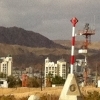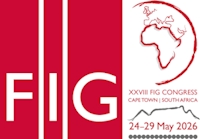|
CONTACT International Federation of Surveyors, FIG |
PUBLICATIONS
FIG Publications FORTHCOMING EVENTS FIG Regional Conference 2024FIG Working Week 2025 All Forthcoming Events |
FEDERATION OrganisationMembers Commissions Young Surveyors Network Capacity Building Network Task Forces FIG Foundation |
ABOUT FIG FIG is a non-governmental organization of national member associations in the field of surveying. About FIGFIG Profile |
|
Follow FIG: |
| Our Data Privacy and Transaction Security Policy | Transactions on this site are secured by THAWTE |
©2026 FIG | Page last revised: 2025-8-12
|


























 24-29 May 2026 in Cape Town,
South Africa:
24-29 May 2026 in Cape Town,
South Africa: